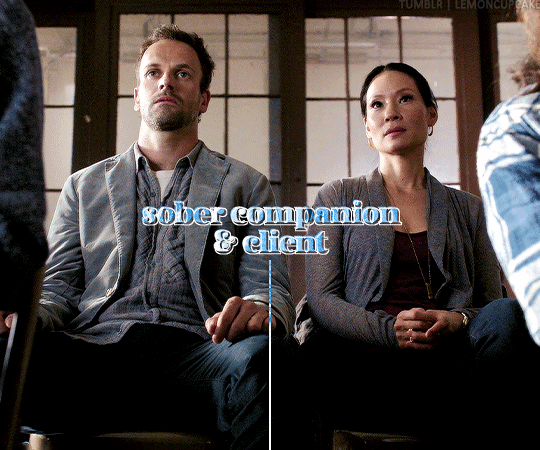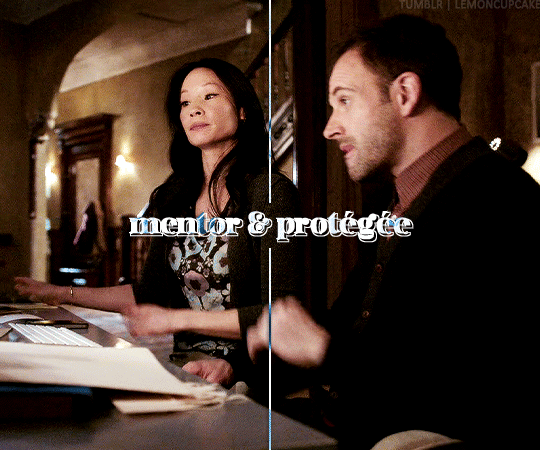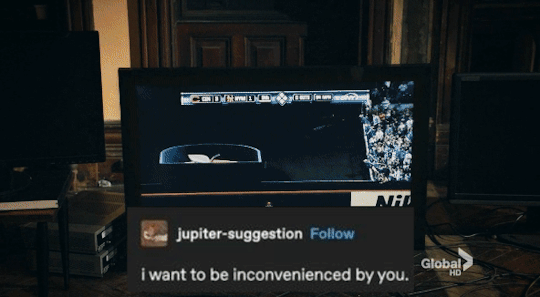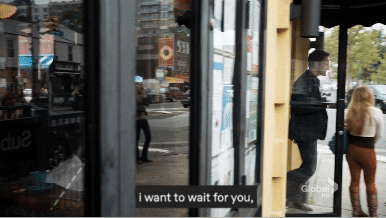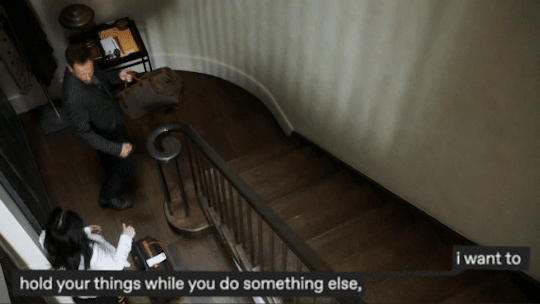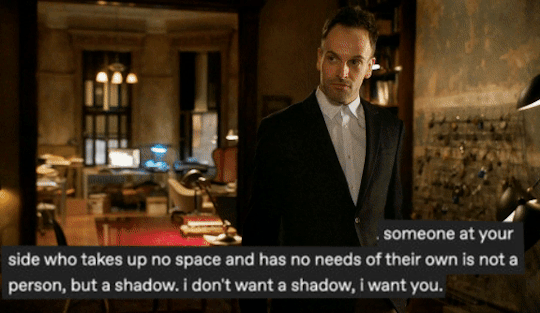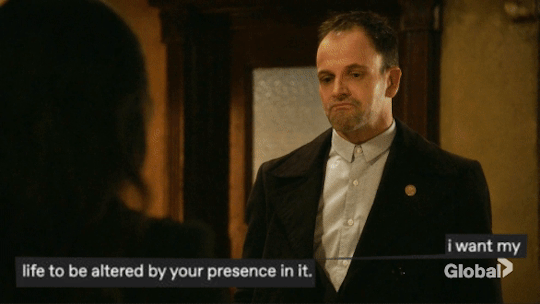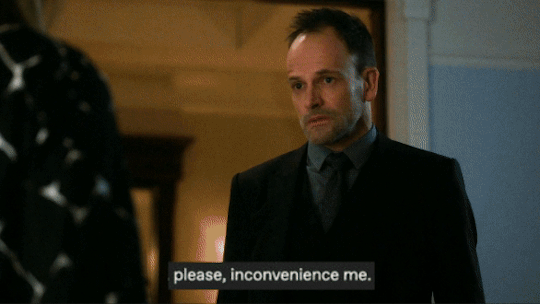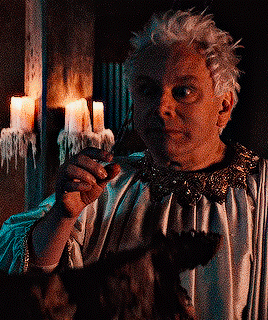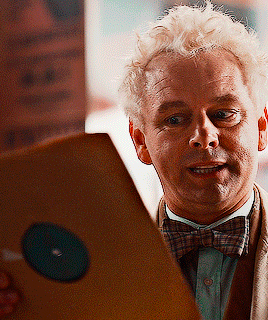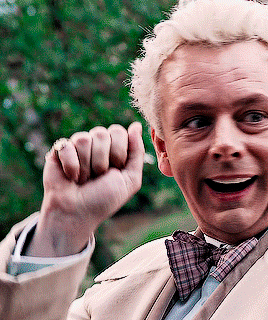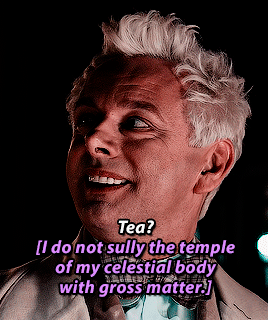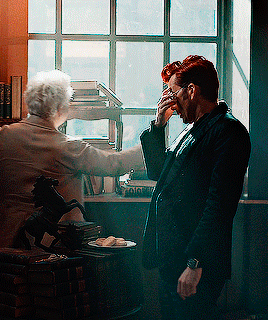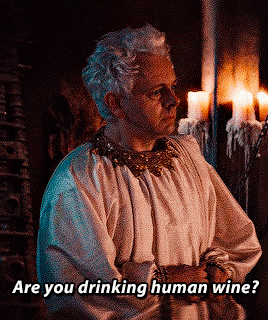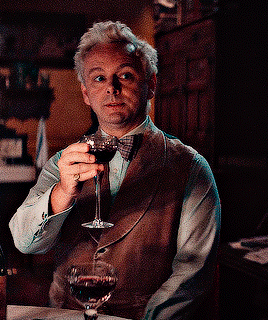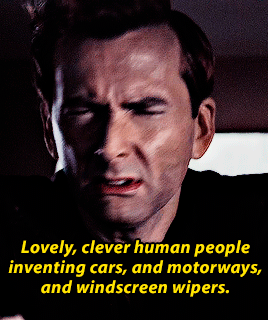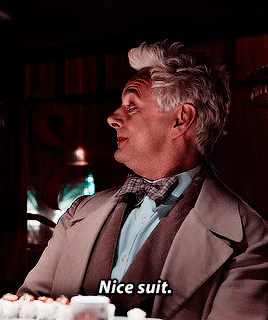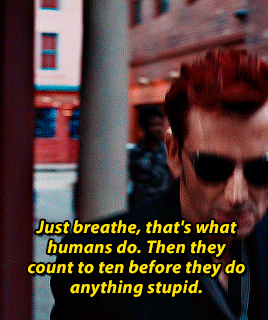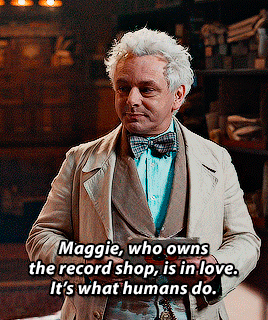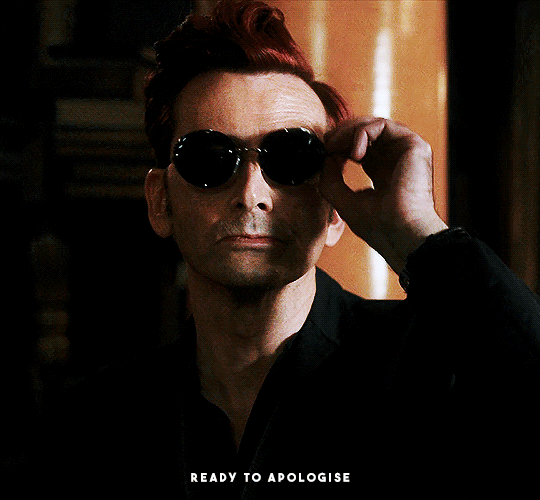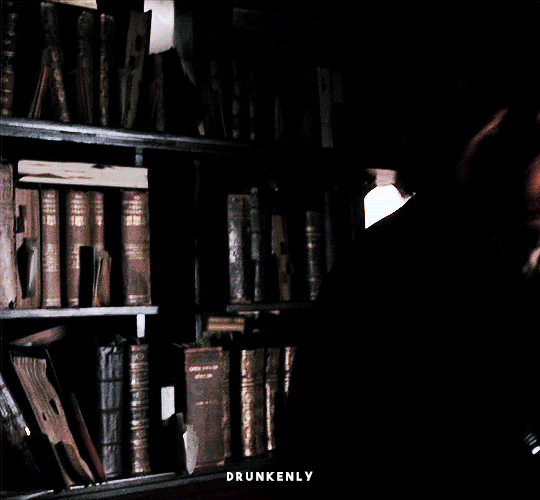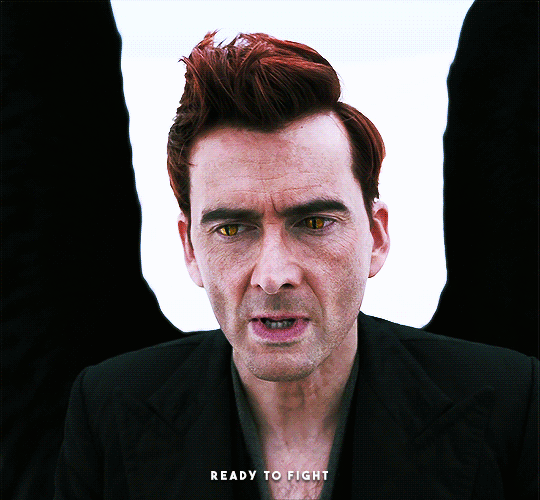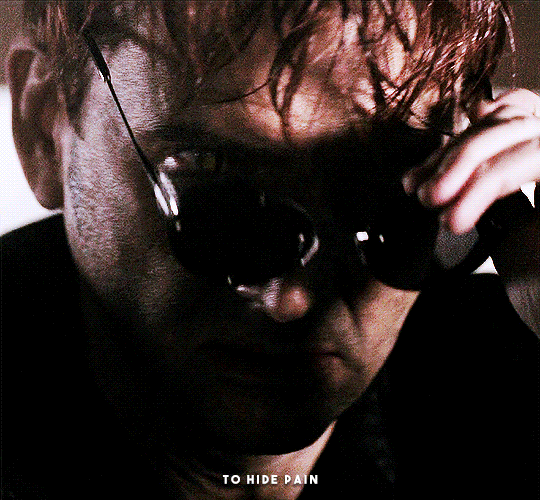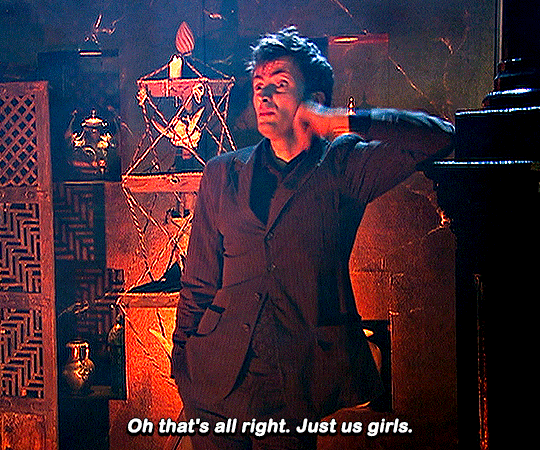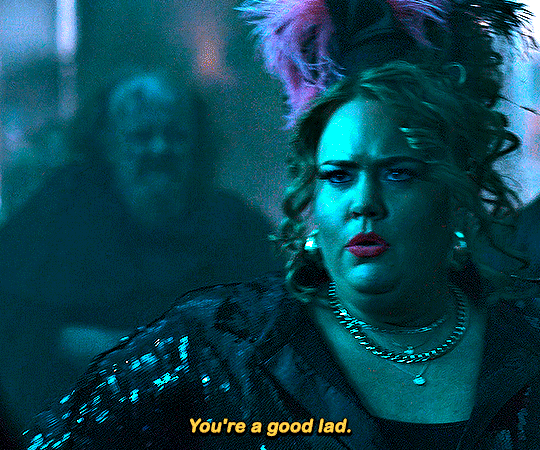Text
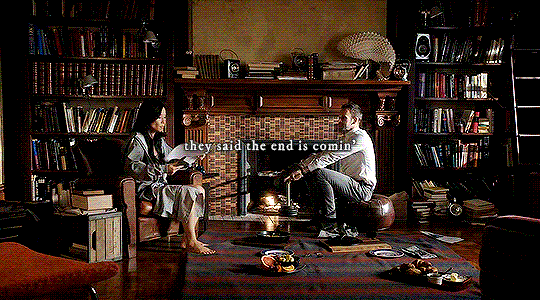


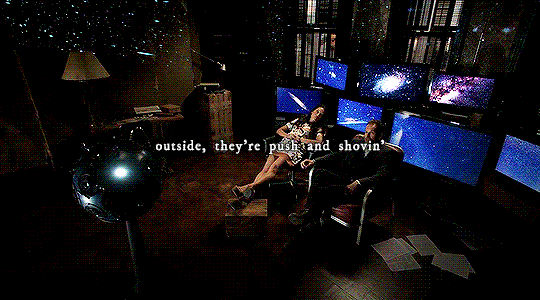
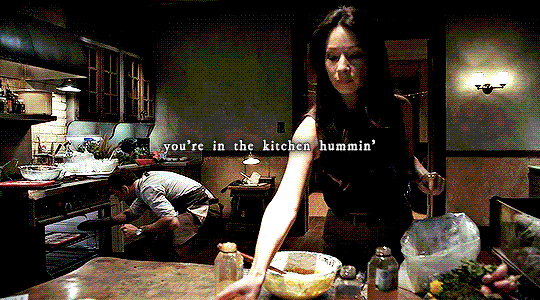

on the way home, I wrote a poem, you say "what a mind", this happens all the time
606 notes
·
View notes
Text
Alastor Episodes 7 and 8 Thoughts
These two episodes really gave us a lot in regards to Alastor and I cannot wait to see where they go with him in season 2. What I find most fascinating about what they established with him in these episodes is how I think this perfectly sets up Alastor to directly challenge the show’s main themes of redemption.
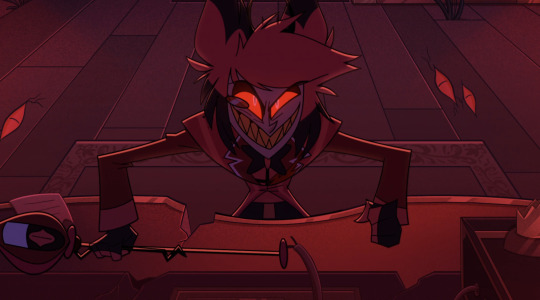
Alastor is the only character in the main cast that I think could effectively challenge Charlie’s idea of redemption by making her face the question of “where the line for who can be redeemed and who is too far gone is?”
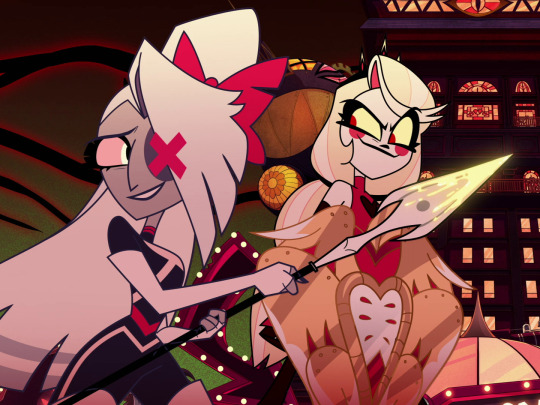
Even Vaggie and her past as an exorcist couldn’t challenge Charlie’s ideals in the same way because Vaggie so clearly wants to be better and is trying to be better. She could only challenge Charlie’s idea of who could be redeemed. She couldn’t truly challenge the line of when someone is too far gone unlike Alastor.
And to explain this I'll just jump right in.
It’s clear these two episodes were meant to show a shift in Alastor and Charlie’s relationship in some capacity. It’s a bit more of a subtle shift than with the other characters, but I think it’s setting up this future conflict well for the limited time the show has.
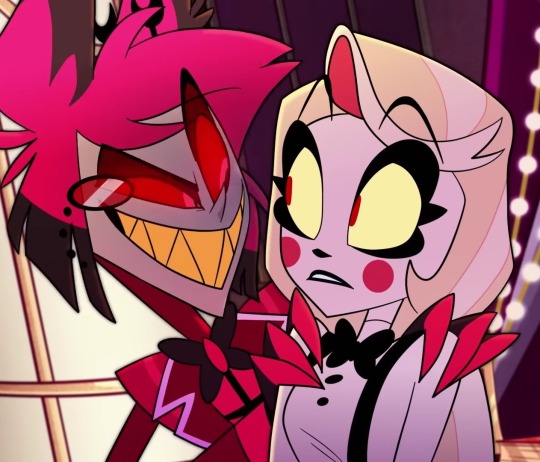
At the start Charlie doesn’t think Alastor cares and calls him out on this. She directly states that she believes he enjoys the suffering. He refutes her idea of him by stating she doesn’t know what he feels. He purposefully hides his feelings behind a smile as a sign of control. (The first shift. It tells her there’s more beneath the surface)
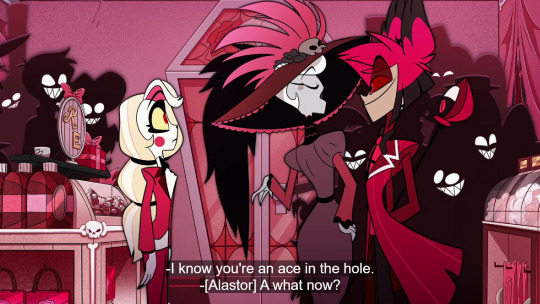
Then Alastor helps Charlie enlist cannibal town and says he wants to mentor her in the song. This is more than the initial indifference and humor he got out of Charlie at the beginning. There’s an interest in seeing Charlie grow and being a part of it that wasn't there before. And, with Alastor helping Charlie here, trust is being built (at least on Charlie's end).
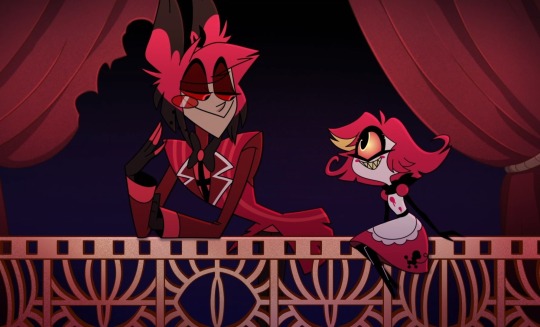
Then Alastor talks to Niffty (who he is clearly fond of) and admits he finds the group enjoyable to be around. He says he could grow accustomed to them after Niffty says she really likes them almost in agreement with her. He's very candid with Niffty and doesn't seem to feel the need to hide his emotions around her. They appear to be on the same wavelength.

And finally, Charlie is upset when she thinks that Alastor died against Adam and hugs him happily when he returns. In Charlie’s eyes Alastor has been helpful and risked himself and his power to protect the hotel. This is a true shift in their relationship on Charlie's end.
This bond is necessary because if (at the very least) Charlie doesn't care about Alastor then he won't be able to truly challenge her idea of redemption and the show implies it doesn't just go one way. It's just obscured.
To explain what I mean I want to look at Alastor's role in the final battle and that moment when he is alone after he escapes.
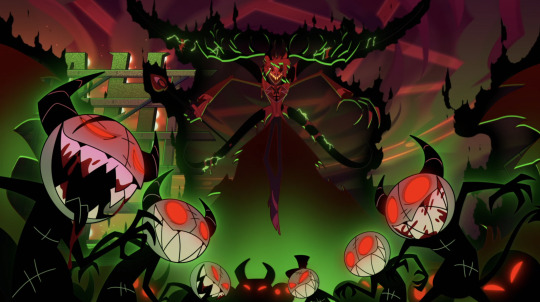
At the beginning of the battle he felt like the trump card he should have been. He makes the exorcists, before Adam destroys his shield, look like a joke. And he gives Adam a run for his money before he becomes overconfident and lets his guard down. He didn’t expect Adam to bounce back and have that much power left to show. He was caught completely off guard and paid the price.
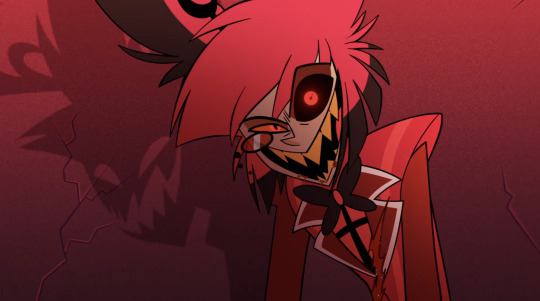
And instead of staying to face the end with the rest of the people in the hotel Alastor opts to save himself. He places himself first. When he leaves he seems almost smug, spouting off a one liner and smiling as he sinks into the shadows. It seems calculated and calm, but alone is a completely different story. This moment shakes Alastor and that moment alone puts his fight against Adam and decision to flee in a different light.
In this moment when he's alone he starts to lose it, saying there has to be a way out. This isn’t where things end. He will come out on top.
He can feel his control over the situation slipping. His power and notoriety has been challenged left and right this season. First Vox, then Lucifer, then the loan sharks, now Adam. It’s one right after the other. And Adam almost killed him.
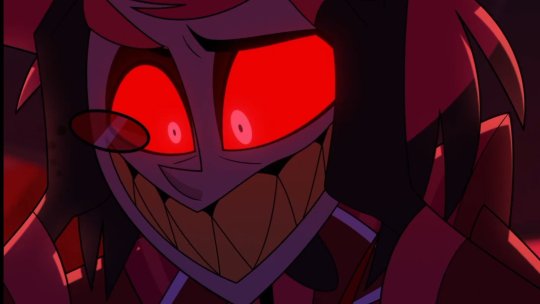
He’s struggling to grasp onto what little control he has left by forcing himself to keep on his smile and it calls back to the beginning of episode 7 when he says to Charlie that just because she sees a smile doesn't mean she knows how he really feels. His smile is a sign of control. And even in this moment you can see that last bit of control slipping. And it’s left him even more desperate for his freedom than before.
The Radio Demon was introduced almost as if he was an all powerful entity and now he is being brought back down to earth and he’s raging against it, barely keeping it just below the surface.
But there’s even more to his breakdown than just his pride. The lines “Great Alastor, altruist, died for his friends. Sorry to disappoint that is not where this ends. I’m hungry for freedom like never before. The constraints of my deal surely have a backdoor.” strongly imply that he really does care for the residents of the hotel more than he wants to admit even to himself.
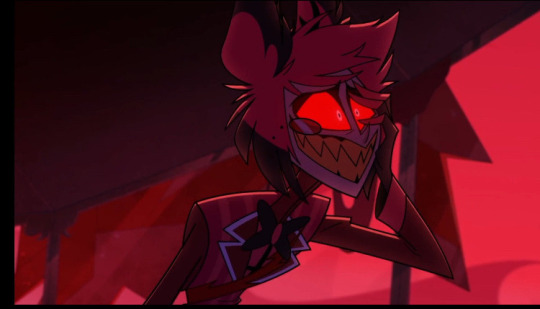
He is freaking out because he got too close to dying trying to protect and help people that he never thought he would care at all about and he’s doubling down on his plans from before.
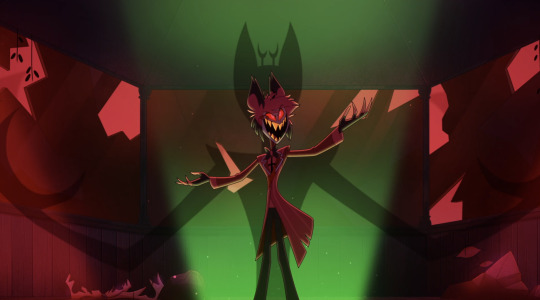
His immediate desperation to be free implies he is at the hotel because he is forced to be there, but he’s desperate to get out of the contract because he doesn’t like how it’s changing him. Alastor has always put himself first and here he is almost dying trying to protect this hotel and it's rattled him even more deeply than the blow to his pride.
I feel like they know exactly what Alastor can mean thematically and they want you to know he’s a villain while seeding hints there could be change under the surface (ones that Alastor himself is afraid of and wants to double down against). There’s a balancing act going on with him and it seems they really do want to challenge the idea of redemption with him. Not just Charlie’s, but his own as well.
Alastor is still in my opinion the best written character in the series. There’s just so much to unravel with him and he’s the most fun to try and dissect to me. I can’t wait to see what they have planned for him in season 2.
2K notes
·
View notes
Text
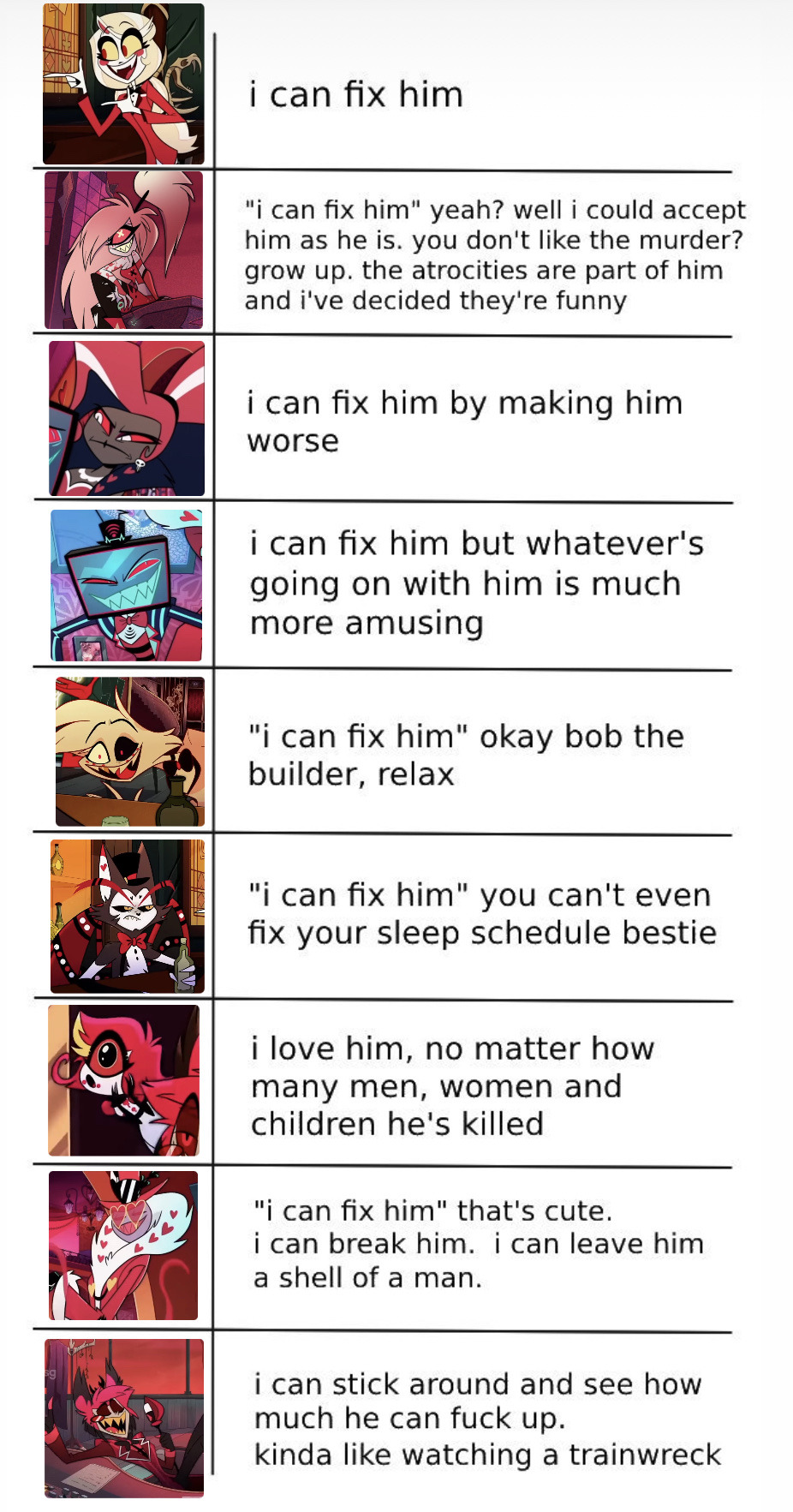
…pretty sure these are all canon
Template credit: @methodwriting
19K notes
·
View notes
Text
True love is when you love the person as a whole. Even...
If he doesn't agree with you,
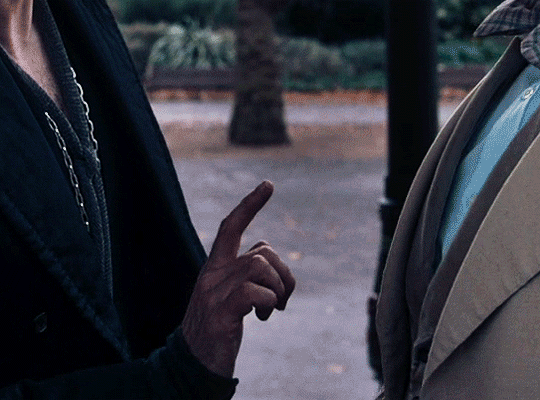
If he does silly things,
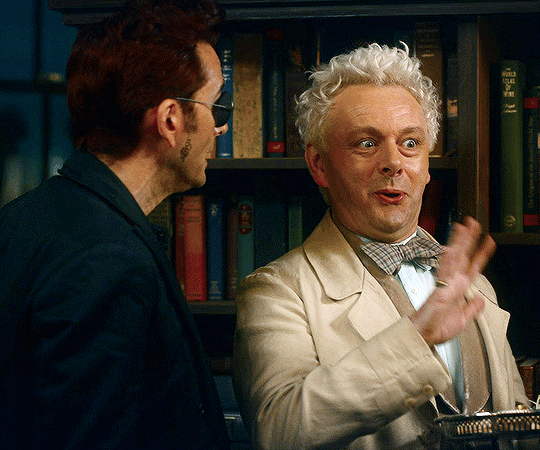
If he talks too much,
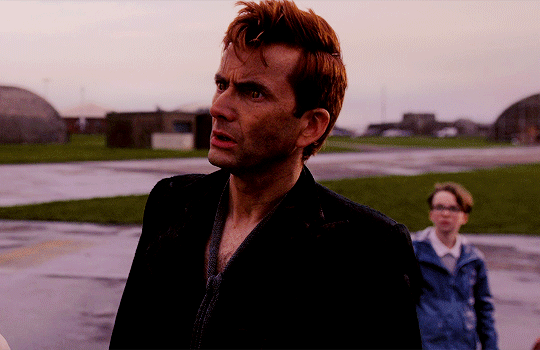
If he doesn't talk to you at all,
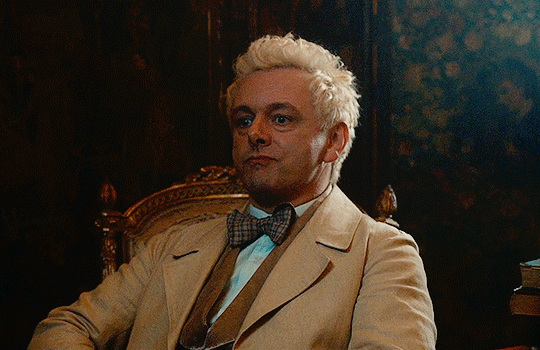
If he repeatedly embarrasses himself,
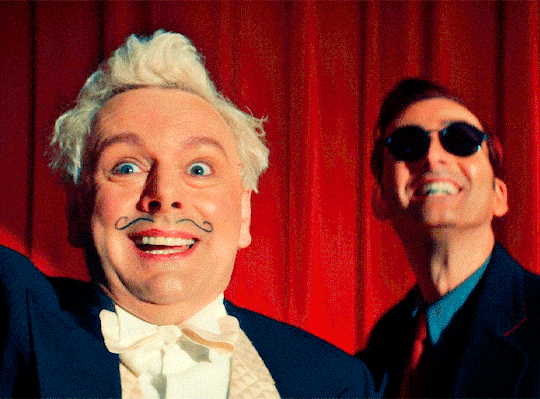
If he makes bad decisions,
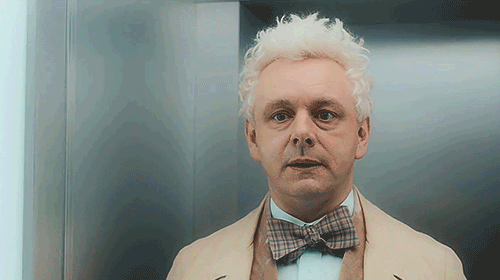
If he comes with I-told-you-so,
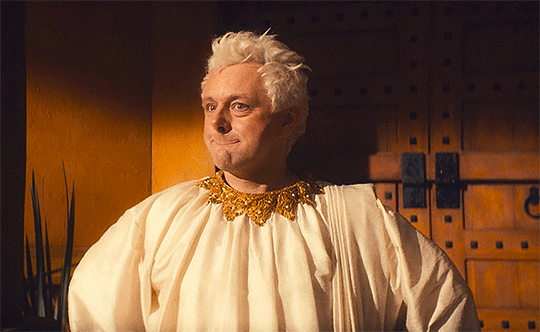
If he asks the impossible,
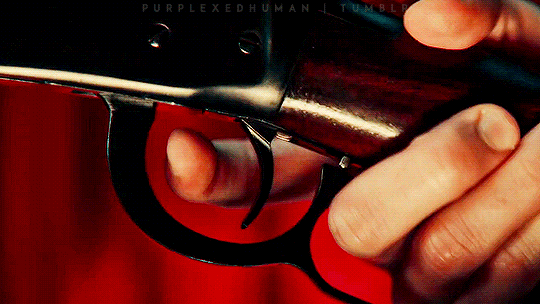
If he acts like he doesn't care.
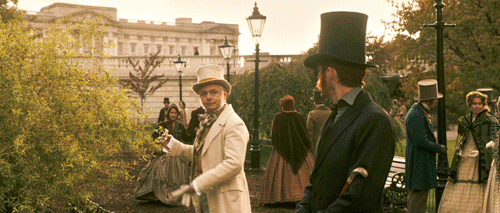
...
And if you do it right, he will look at you like you are the only one in the whole wide universe.
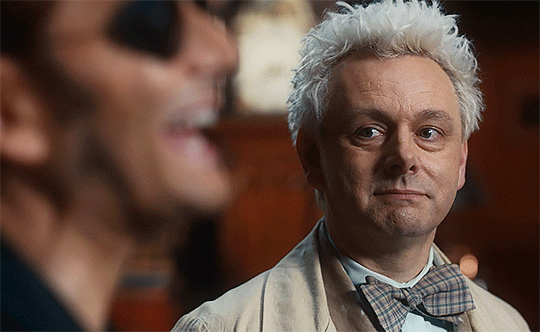
1K notes
·
View notes
Text
Thoughts on Angel Crowley & Healing from Trauma
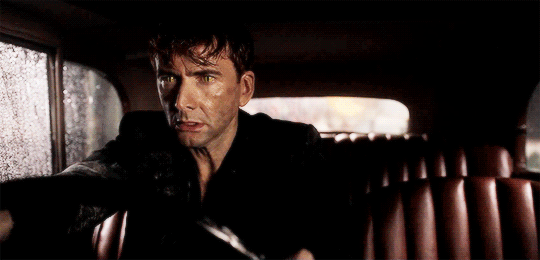
(Minor Good Omens S2 Spoilers)
As someone who’s endured my own Trauma and dealt with the resulting PTSD, watching Crowley’s journey from a joyful, silly, and entirely innocent angel to a withdrawn, lonely, hyper-vigilant demon as a result of the Fall both shattered my heart and confronted me with the fact of myself, and I’d like to talk about it.
When you* experience Trauma, you experience an existential disorientation and a profound sense of grief over the world you thought you knew–one where you were safe and nothing bad had ever happened to you. “Innocence died screaming,” and all that.
You're also therefore mourning the loss of who you were, and struggling to make sense of who you are now. Which is why this conversation is so gut-wrenching:
“I know you.”
“You do not know me.”
“I knew the angel you were.”
“The angel you knew is not me.”
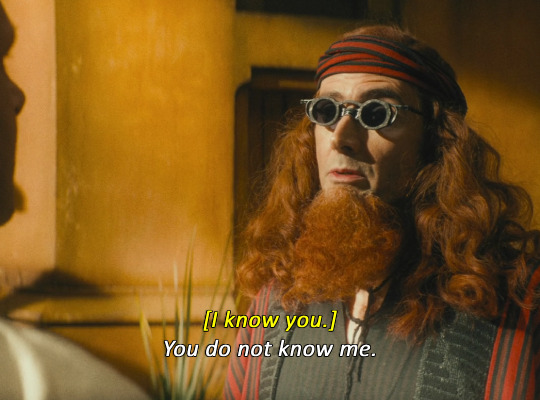
This dialogue admittedly still makes my eyes swim. It’s reminiscent of the many conversations I’ve had with people close to me who knew me Before and After. Not only are you grieving the loss of your own innocence, so are those around you, and it feels like you’re wearing their loved one’s face like a mask.
And then underneath the grief, there’s a river of–what you’ll later discover is misplaced–guilt. They want you to be who you were. Fuck, you also want to be who you were -- to not have experienced what you did -- but you can’t.

And when they catch a glimpse of something that reminds them of Before-You -- because it's not like that you has just up and vanished, you've just changed -- they say things like, “I feel like I have you back!” Like the After-You is a consolation prize, something to be tolerated while they wait for the Before-You to return.
It’s not malicious. They love you. They want you to be happy. But it just serves as a reminder of your loss and suddenly you’re acutely aware of how alone you are with the Thing that hurt you.
After trauma, you’re lonely and you're afraid. But those emotions make you feel quite naked, because both of those things would require you to depend on other people to feel better and, at this point, the thought of doing that is far too scary, so to the world, you’re angry. Thus begins the cyclical self-fulfilling prophecy.
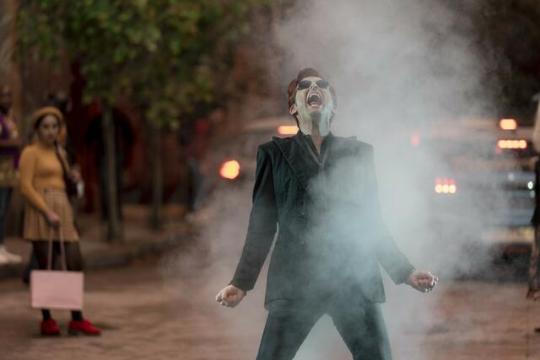
And that cycle goes a bit like this: People see the mistrust and the bitterness and the volatility (the shield that keeps people at an arm's length and helps you feel safe). They don't see the profound sustained fear underneath, the desperate need to feel seen and accepted. And so people pull away.
And that real or perceived abandonment feeds the monster that’s taken up permanent residence in your ribcage and screams at all hours that you’re not worthy of love, that you’re irreparably broken, and you’ll always be alone. And you pull away from the people that love you. And the cycle repeats. And you start to believe all of the bad things about yourself that the monster tells you.

Being confronted with a character who you adore and who you also relate to closely is bittersweet in that it’s both immensely painful, but also offers you an opportunity to interrupt that cycle, to explore a different -- perhaps more forgiving -- lens through which to view yourself. To practice self-compassion by proxy, if you will. After all, we tend to extend far greater empathy and forgiveness to others than we do to ourselves.
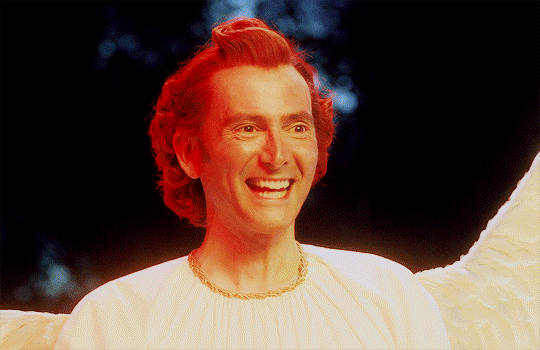
Angel Crowley, "who squeaked and squealed when he was happy; who flailed his arms around and made explosion noises with his mouth to explain nebulas; who preened when told his stars were pretty,” (joycrispy) reminded me a lot of “Angel T,” or rather myself before Trauma.
And Crowley's story is tragic. I was heartbroken and angry for him; I felt the depth of the betrayal he experienced at the hands of someone he loved who he'd believed loved him; I found myself wanting to protect him, to comfort him. Crowley did not deserve what happened to him.
And, over a decade later, I realized that I’d finally accepted that I’d been an innocent, just like Crowley had, and I didn't deserve what happened to me, either.
And -- if you find yourself relating to this post -- neither did you.

Once we can tell ourselves that and actually believe it, we can start to lower the shield. We can allow people closer, including ourselves. We can bring the parts of ourselves we may have hidden away back to the surface. We can soften again. We can truly start to heal.
Crowley, at his core, remains the same. He is still kind, deeply loving, playful, silly, and – against all odds – hopeful. But his trauma has changed him; his innocence is gone.
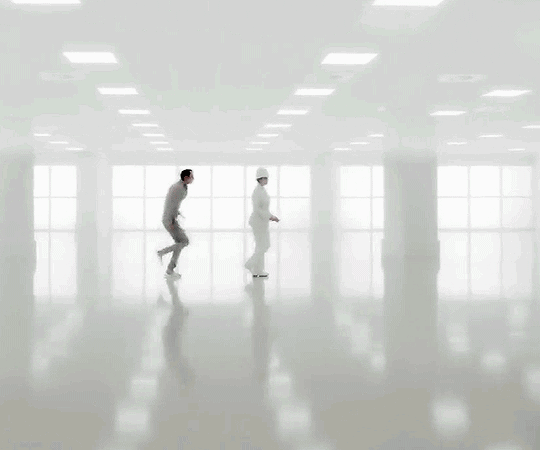
He struggles to trust others; fears abandonment; engages in unhealthy coping mechanisms; finds it easier to prioritize and tend to Aziraphale's needs and desires than his own; and has difficulty expressing his emotions.
But he also gained an abundance of empathy, a deep love for humanity, and a strong sense of justice.
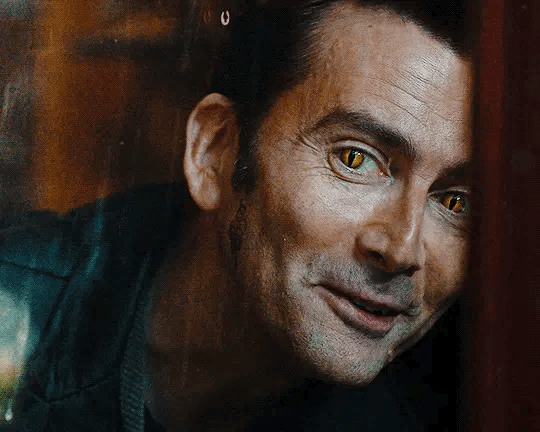
We adore Crowley exactly as he is now; we don't wish for him to be who he was before the Fall. And neither does Aziraphale.
In kind, we won’t be who we were — nor should we try to be — but we can be something new, a different version of ourselves that is equally good, equally worthy, and equally deserving of love.

After over a decade, I think my Trauma wound has mostly healed, as much as Trauma wounds can, anyway; it’s a dull ache rather than an acute pain. Yet Crowley's story assuaged that remaining hurt like a salve I hadn’t realized I needed.
So thank you to @neil-gaiman for giving us such a beautiful story, and to David Tennant, Michael Sheen, and the rest of the cast and crew who bring the characters we love to life on screen.
Good Omens truly is a gift. May it continue to inspire us to offer kindness and love to ourselves and one another. 🖤
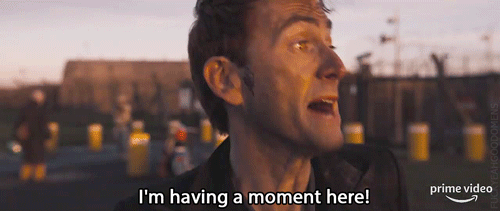
* I am aware that I say “you” when I should use the singular first-person “I,” but I still struggle with this when talking about my own trauma. So I’m using “you” and you, reader, will deal with it x
2K notes
·
View notes
Text
reblog if you’ve read fanfictions that are more professional, better written than some actual novels. I’m trying to see something
111K notes
·
View notes
Text
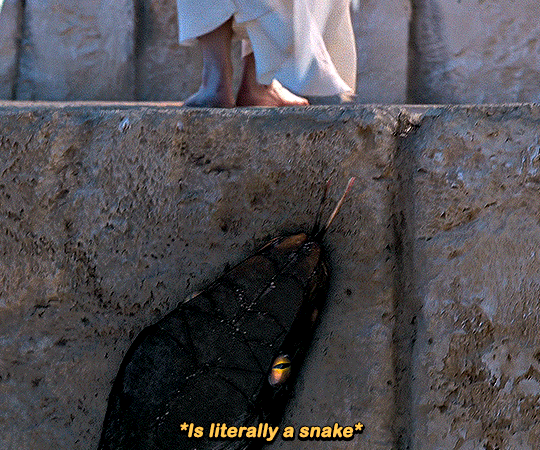

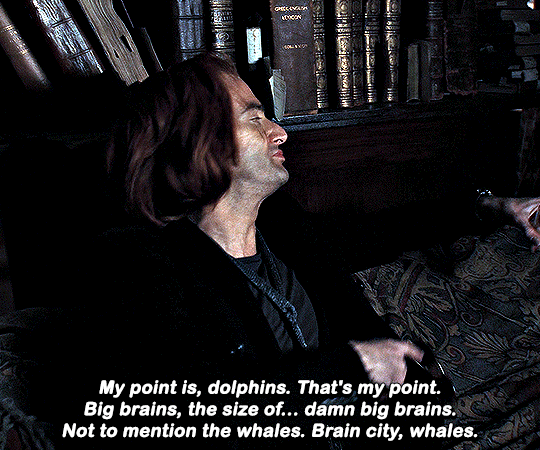


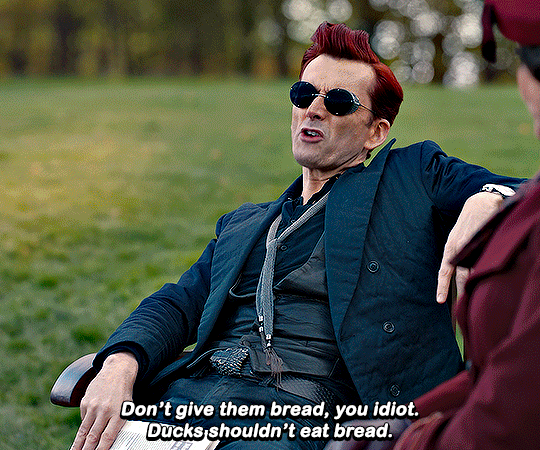
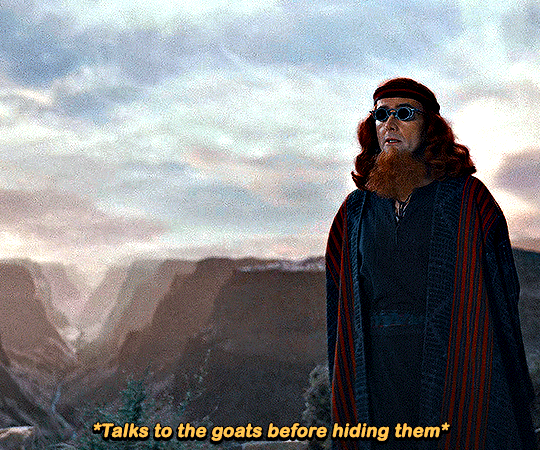


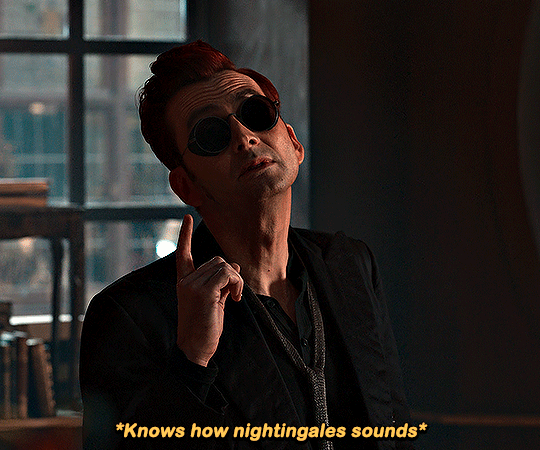

Crowley + his love for animals (insp)
Bonus, Aziraphale knows him so well:

4K notes
·
View notes
Text
Awhile ago @ouidamforeman made this post:
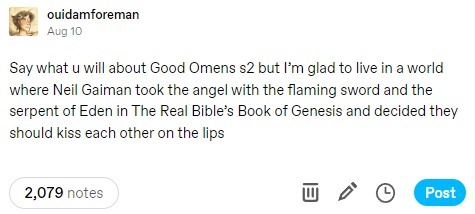
This shot through my brain like a chain of firecrackers, so, without derailing the original post, I have some THOUGHTS to add about why this concept is not only hilarious (because it is), but also...
It. It kind of fucks. Severely.
And in a delightfully Pratchett-y way, I'd dare to suggest.
I'll explain:
As inferred above, both Crowley AND Aziraphale have canonical Biblical counterparts. Not by name, no, but by function.
Crowley, of course, is the serpent of Eden.
(note on the serpent of Eden: In Genesis 3:1-15, at least, the serpent is not identified as anything other than a serpent, albeit one that can talk. Later, it will be variously interpreted as a traitorous agent of Hell, as a demon, as a guise of Satan himself, etc. In Good Omens --as a slinky ginger who walks funny)
Lesser known, at least so far as I can tell, is the flaming sword. It, too, appears in Genesis 3, in the very last line:
"So he drove out the man; and placed at the east of the garden of Eden Cherubims, and a flaming sword which turned every way, to keep the way of the tree of life."
--Genesis 3:24, KJV
Thanks to translation ambiguity, there is some debate concerning the nature of the flaming sword --is it a divine weapon given unto one of the Cherubim (if so, why only one)? Or is it an independent entity, which takes the form of a sword (as other angelic beings take the form of wheels and such)? For our purposes, I don't think the distinction matters. The guard at the gate of Eden, whether an angel wielding the sword or an angel who IS the sword, is Aziraphale.
(note on the flaming sword: in some traditions --Eastern Orthodox, for example-- it is held that upon Christ's death and resurrection, the flaming sword gave up it's post and vanished from Eden for good. By these sensibilities, the removal of the sword signifies the redemption and salvation of man.
...Put a pin in that. We're coming back to it.)
So, we have our pair. The Serpent and the Sword, introduced at the beginning and the end (ha) of the very same chapter of Genesis.
But here's the important bit, the bit that's not immediately obvious, the bit that nonetheless encapsulates one of the central themes, if not THE central theme, of Good Omens:
The Sword was never intended to guard Eden while Adam and Eve were still in it.
Do you understand?
The Sword's function was never to protect them. It doesn't even appear until after they've already fallen. No... it was to usher Adam and Eve from the garden, and then keep them out. It was a threat. It was a punishment.
The flaming sword was given to be used against them.
So. Again. We have our pair. The Serpent and the Sword: the inception and the consequence of original sin, personified. They are the one-two punch that launches mankind from paradise, after Hell lures it to destruction and Heaven condemns it for being destroyed. Which is to say that despite being, supposedly, hereditary enemies on two different sides of a celestial cold war, they are actually unified by one purpose, one pivotal role to play in the Divine Plan: completely fucking humanity over.
That's how it's supposed to go. It is written.
...But, in Good Omens, they're not just the Serpent and the Sword.
They're Crowley and Aziraphale.
(author begins to go insane from emotion under the cut)
In Good Omens, humanity is handed it's salvation (pin!) scarcely half an hour after losing it. Instead of looming over God's empty garden, the sword protects a very sad, very scared and very pregnant girl. And no, not because a blameless martyr suffered and died for the privilege, either.
It was just that she'd had such a bad day. And there were vicious animals out there. And Aziraphale worried she would be cold.
...I need to impress upon you how much this is NOT just a matter of being careless with company property. With this one act of kindness, Aziraphale is undermining the whole entire POINT of the expulsion from Eden. God Herself confronts him about it, and he lies. To God.
And the Serpent--
(Crowley, that is, who wonders what's so bad about knowing the difference between good and evil anyway; who thinks that maybe he did a GOOD thing when he tempted Eve with the apple; who objects that God is over-reacting to a first offense; who knows what it is to fall but not what it is to be comforted after the fact...)
--just goes ahead and falls in love with him about it.
As for Crowley --I barely need to explain him, right? People have been making the 'didn't the serpent actually do us a solid?' argument for centuries. But if I'm going to quote one of them, it may as well be the one Neil Gaiman wrote ficlet about:
"If the account given in Genesis is really true, ought we not, after all, to thank this serpent? He was the first schoolmaster, the first advocate of learning, the first enemy of ignorance, the first to whisper in human ears the sacred word liberty, the creator of ambition, the author of modesty, of inquiry, of doubt, of investigation, of progress and of civilization."
--Robert G. Ingersoll
The first to ask questions.
Even beyond flattering literary interpretation, we know that Crowley is, so often, discreetly running damage control on the machinations of Heaven and Hell. When he can get away with it. Occasionally, when he can't (1827).
And Aziraphale loves him for it, too. Loves him back.
And so this romance plays out over millennia, where they fall in love with each other but also the world, because of each other and because of the world. But it begins in Eden. Where, instead of acting as the first Earthly example of Divine/Diabolical collusion and callousness--
(other examples --the flood; the bet with Satan; the back channels; the exchange of Holy Water and Hellfire; and on and on...)
--they refuse. Without even necessarily knowing they're doing it, they just refuse. Refuse to trivialize human life, and refuse to hate each other.
To write a story about the Serpent and the Sword falling in love is to write a story about transgression.
Not just in the sense that they are a demon and an angel, and it's ~forbidden. That's part of it, yeah, but the greater part of it is that they are THIS demon and angel, in particular. From The Real Bible's Book of Genesis, in the chapter where man falls.
It's the sort of thing you write and laugh. And then you look at it. And you think. And then you frown, and you sit up a little straighter. And you think.
And then you keep writing.
And what emerges hits you like a goddamn truck.
(...A lot of Pratchett reads that way. I believe Gaiman when he says Pratchett would have been happy with the romance, by the way. I really really do).
It's a story about transgression, about love as transgression. They break the rules by loving each other, by loving creation, and by rejecting the hatred and hypocrisy that would have triangulated them as a unified blow against humanity, before humanity had even really got started. And yeah, hell, it's a queer romance too, just to really drive the point home (oh, that!!! THAT!!!)
...I could spend a long time wildly gesturing at this and never be satisfied. Instead of watching me do that (I'll spare you), please look at this gif:
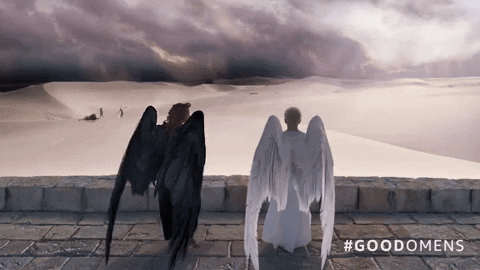
I love this shot so much.
Look at Eve and Crowley moving, at the same time in the same direction, towards their respective wielders of the flaming sword. Adam reaches out and takes her hand; Aziraphale reaches out and covers him with a wing.
You know what a shot like that establishes? Likeness. Commonality. Kinship.
"Our side" was never just Crowley and Aziraphale. Crowley says as much at the end of season 1 ("--all of us against all of them."). From the beginning, "our side" was Crowley, Aziraphale, and every single human being. Lately that's around 8 billion, but once upon a time it was just two other people. Another couple. The primeval mother and father.
But Adam and Eve die, eventually. Humanity grows without them. It's Crowley and Aziraphale who remain, and who protect it. Who...oversee it's upbringing.
Godfathers. Sort of.
27K notes
·
View notes
Text
yeap, it's september and i'm still hyperfixated on good omens
i'm totally normal about that
3 notes
·
View notes
Text


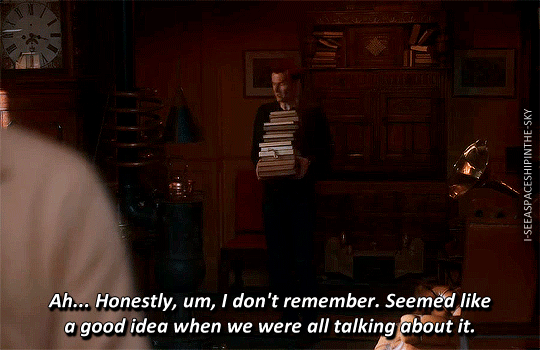



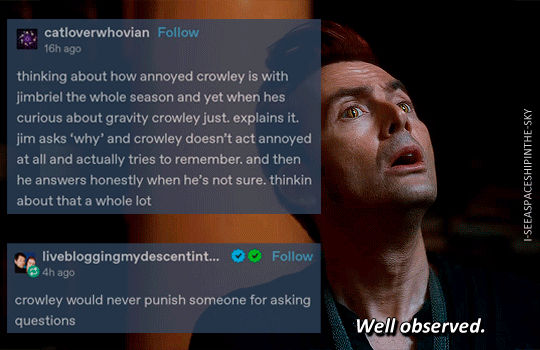
[insp.]
+ happily answering Aziraphale's questions

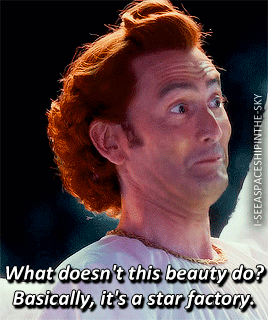
Well, if I was the one running it all, I'd like it if someone asked questions. Fresh point of view.
22K notes
·
View notes
Text
I made this wallpaper for myself but I’m done gatekeeping it


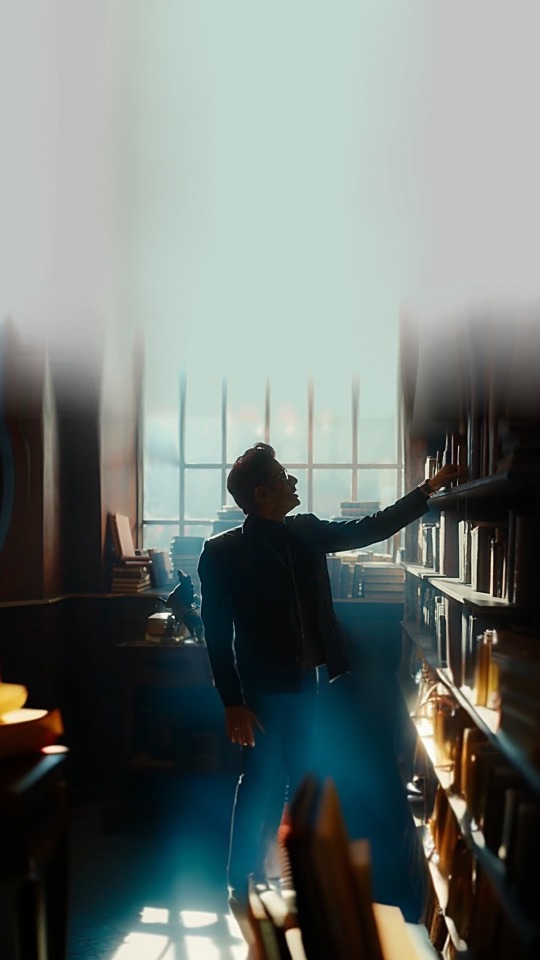
Please enjoy ❤️
PLEASE REPOST IF YOU SAVE / USE
297 notes
·
View notes
Text
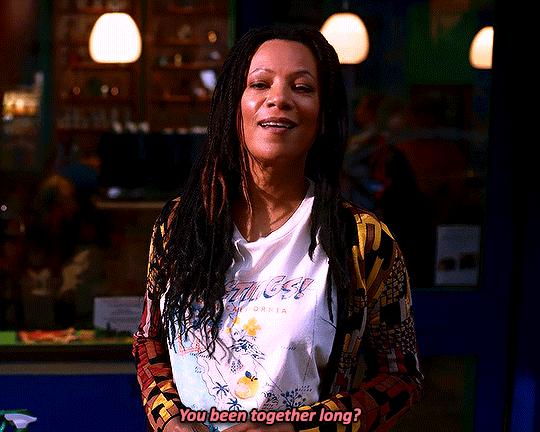
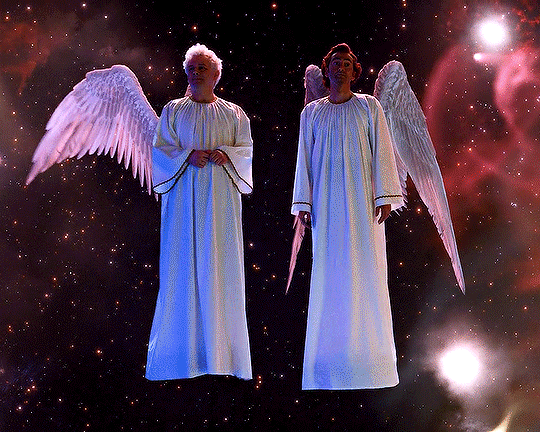
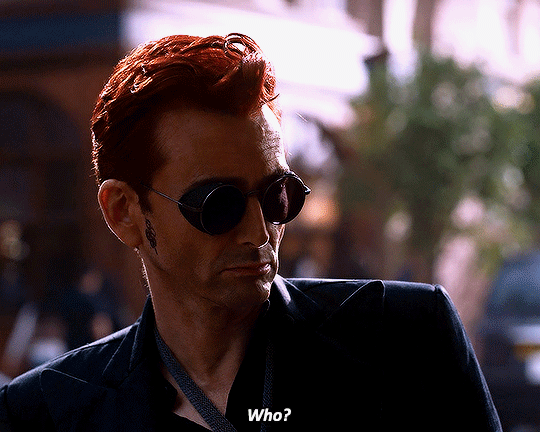
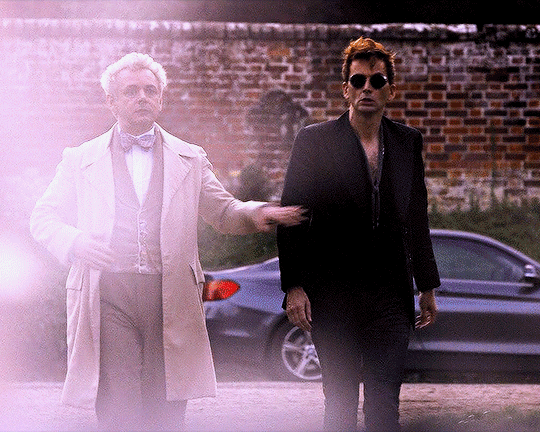
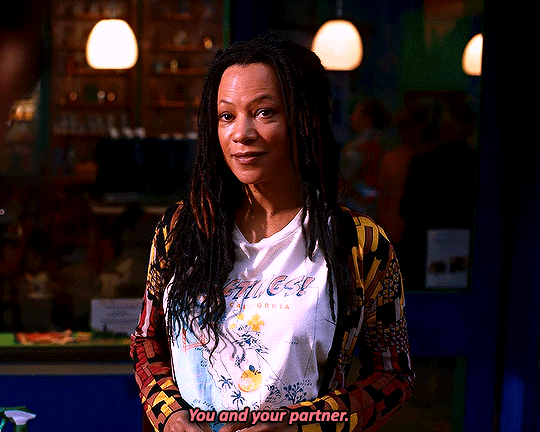


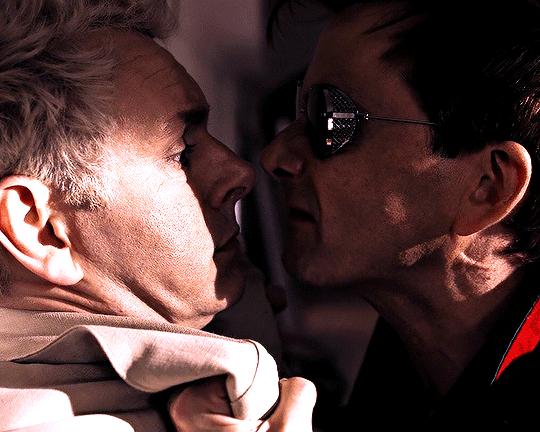





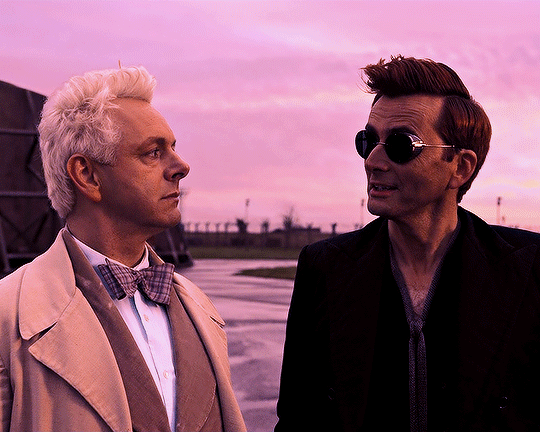
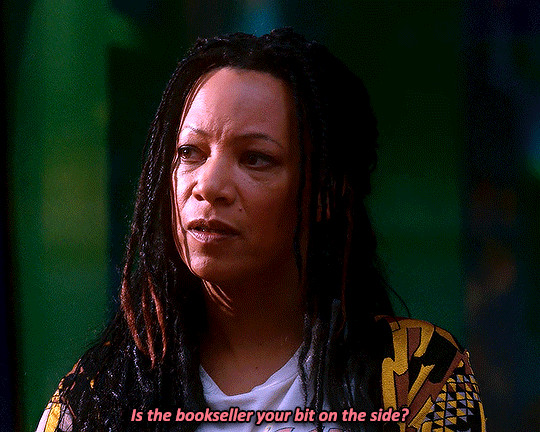
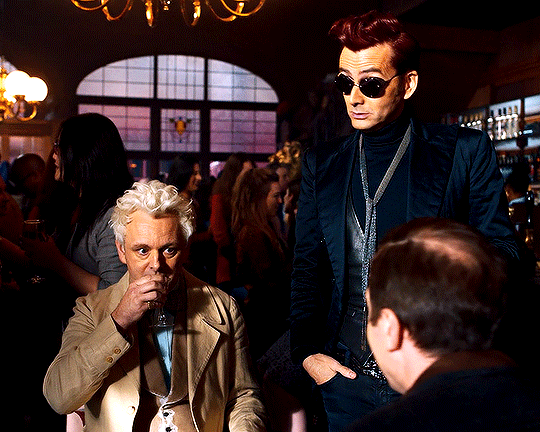
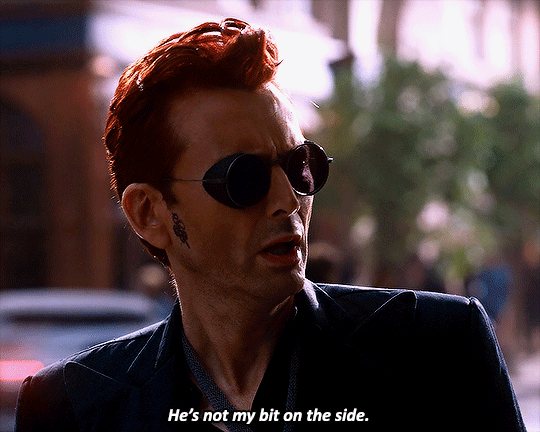
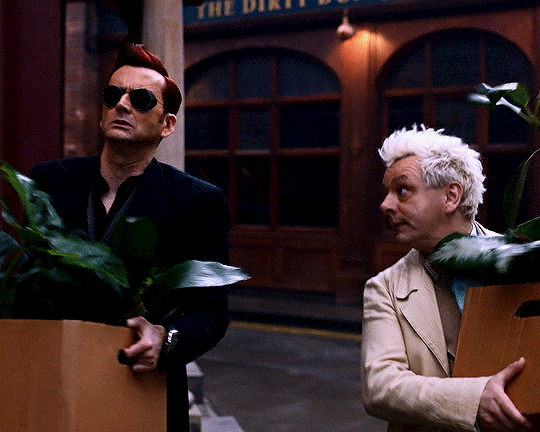
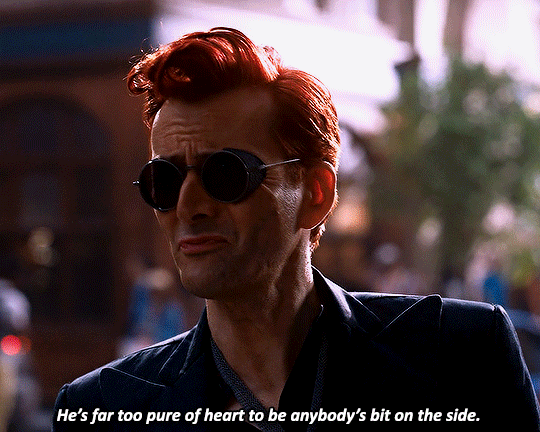
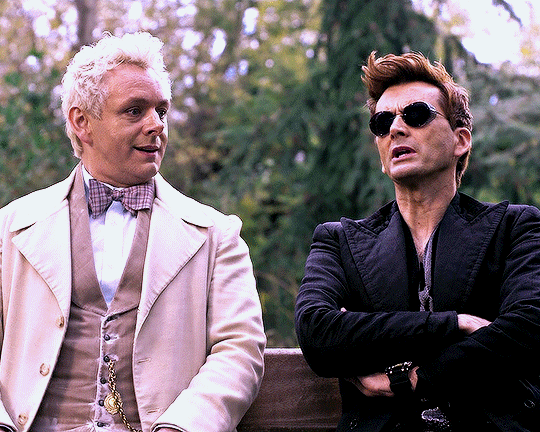
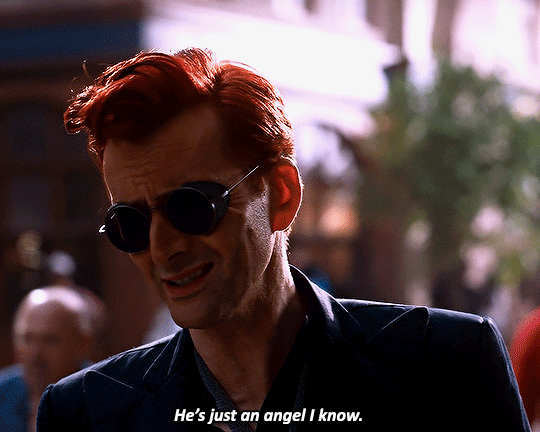
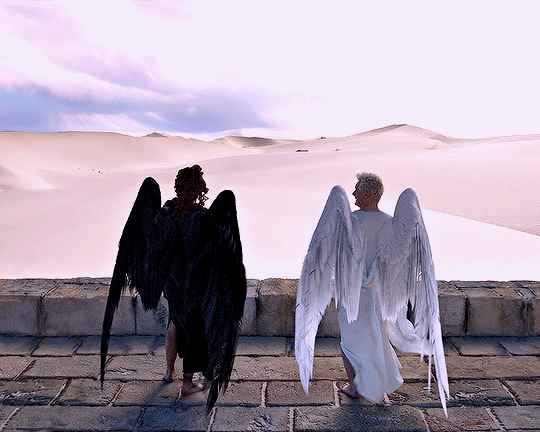
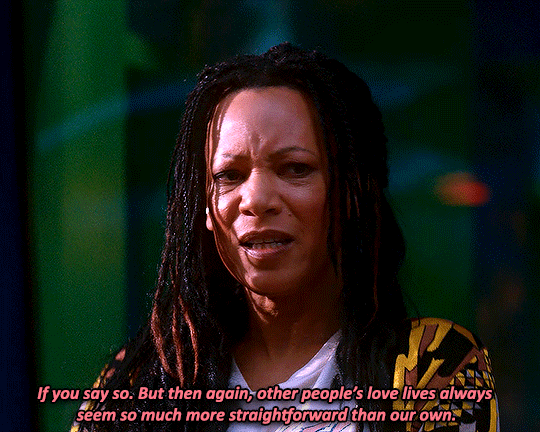
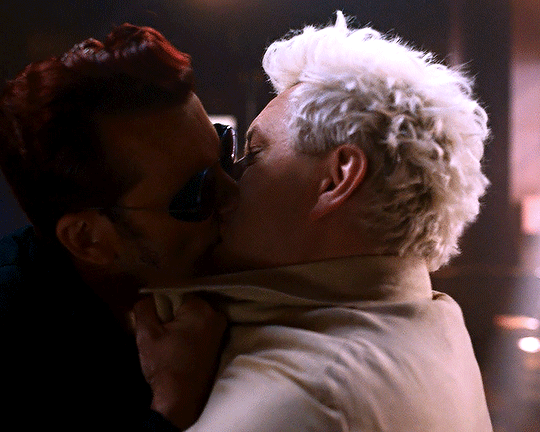
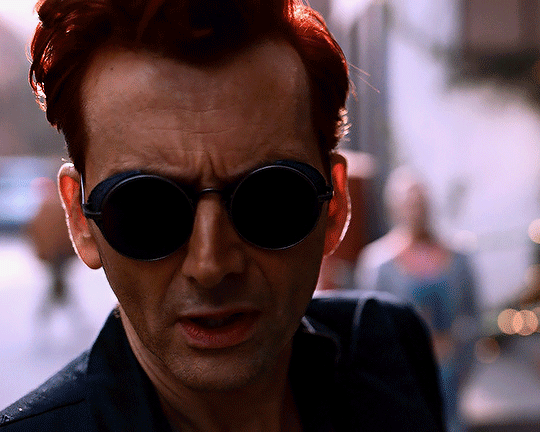
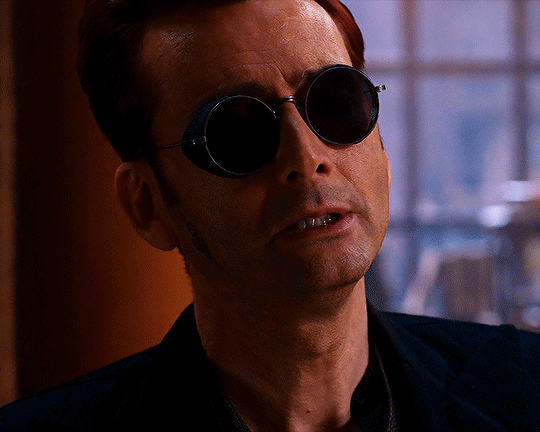
Because you and Mr. Fell don't ever talk to each other. We talk all the time. We've been talking for millions of years. Bla-bla-bla-bla-bla-bla-bla-bla-bla. I say something brilliant, and he says something unintentionally funny back. It's great. You never say what you're really thinking.
22K notes
·
View notes
